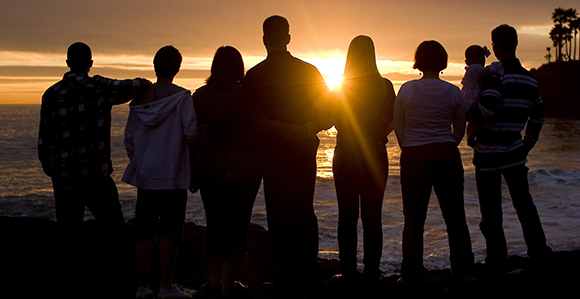BYU Researchers Show Loneliness Can Affect Longevity
Contributed By Ryan Morgenegg, Church News staff writer

A BYU study shows that spending less time alone is beneficial to your health and will increase your life span.
Article Highlights
- New BYU study shows a link between longevity and loneliness.
“We need to start taking our social relationships as seriously as our health. In essence, our relationships not only influence our emotional and psychological well-being, but our data (and others’) shows that social relationships are vital to our physical health and ultimately longevity.” —Dr. Julianne Holt-Lunstad, associate professor of psychology
PROVO, UTAH
“It is not good that the man should be alone” (Genesis 2:18).
In a recent study, Brigham Young University researchers reaffirmed that, indeed, it is not good for man—or woman—to be alone or socially isolated. Results of the study, published in Perspectives on Psychological Science, show that human relationships not only influence emotional and psychological wellbeing but are also vital to physical health and, ultimately, longevity.
“We need to start taking our social relationships as seriously as our health,” said the study’s lead author, Julianne Holt-Lunstad, an associate professor of psychology at BYU, where she also serves as social psychology chair. “In essence, our relationships not only influence our emotional and psychological wellbeing, but our data (and others’) shows that social relationships are vital to our physical health and ultimately longevity,” Dr. Holt-Lunstad said in an interview with the Church News.
According to Perspectives in Psychological Science, a peer-reviewed bimonthly journal, the researchers did an in-depth analysis from more than 70 health studies that included more than 3 million participants’ data. The studies included data for loneliness, social isolation, and living alone. Previous research from Dr. Holt-Lunstad and coauthor Timothy Smith puts the heightened risk of mortality from loneliness in the same category as smoking 15 cigarettes a day and being an alcoholic.
“Not only are we at the highest recorded rate of living alone across the entire century, but we’re at the highest recorded rates ever on the planet,” said Dr. Smith, chair for the Department of Counseling Psychology and Special Education at BYU. “With loneliness on the rise, we are predicting a possible loneliness epidemic in the future,” he said in a BYU news release about the study.

Julianne Holt-Lunstad, associate professor of psychology at BYU, pictured above, served as the lead author of a study that found that human relationships not only influence emotional and psychological wellbeing but are also vital to physical health. Photo by Mark A. Philbrick, BYU

Timothy Smith is coauthor of a BYU study on the effects of relationships with longevity and happiness in life. Photo by Kenny Crookston, BYU.
As detailed in the study, loneliness and social isolation can look very different. For example, someone may be surrounded by many people but still feel alone. Other people may isolate themselves because they prefer to be alone. The effect on longevity, however, is much the same for those two circumstances.
The association between loneliness and risk for mortality among young populations is actually greater than among older populations, said Dr. Holt-Lunstad. She said although older people are more likely to be lonely and face a higher mortality risk, loneliness and social isolation better predict premature death among populations younger than 65 years.
Another interesting finding from the study—considering control for variables such as socioeconomic status, age, gender, and pre-existing health conditions—showed that although the lack of social connections presents an added risk, the existence of relationships provided a positive health effect.
The study stated that there are many things that help to subdue the effects of loneliness. With the evolution of the Internet, people can keep in contact over distances that they couldn’t before. However, the superficiality of some online experiences may miss emotional context and depth. Too much texting can actually hurt a romantic relationship, but the authors of that texting study note that saying something sweet or kind in a text is universally beneficial.
Dr. Holt-Lunstad said in a Church News interview, “Visiting teaching and home teaching programs are tangible ways that help support members. These programs tap into a number of pathways by which scientists have identified as pathways by which our relationships influence health, such as providing tangible resources in times of need and protecting people from feeling isolated.”
“Everyone can experience loneliness,” Dr. Smith told the Church News. “We desire meaningful connections with others and feel keenly the absence of affirmation. However, we are ‘never alone’ (Thomas S. Monson, April 1991 general conference), and recognition of spiritual realities can provide needed comfort. Hope and happiness increase when recognizing blessings and expressing gratitude for them. Although relationship problems can be complex, principles of forgiveness, reconciliation, and humility help us maintain and repair relationships, which require constant effort. Strengthening families helps to save lives.”
